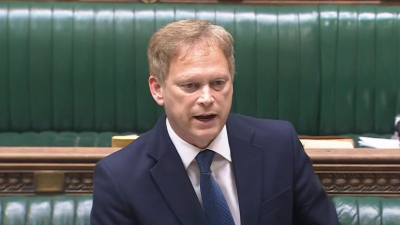Rail Chaos Looms as UK Train Drivers Strike Yet Again
Passengers traversing the bustling rail routes of the UK brace for another round of travel turmoil this Monday, as train drivers prepare to stage their third strike in a mere four days. The walkout, orchestrated by members of Aslef, promises significant disruptions, particularly across East Anglia and the South East, casting shadows over the already beleaguered commuter landscape.
The deadlock persists within Aslef's prolonged wage dispute, stretching over nearly two years without a glimmer of resolution or scheduled negotiations in sight. The impending strike wave is poised to engulf major operators including c2c, Gatwick Express, Greater Anglia, Southeastern, Southern, South Western Railway, Great Northern, and Thameslink.
c2c commuters are slated to bear the brunt of the strike's impact, with Managing Director Rob Mullen expressing deep disappointment over the failure to reach a consensus. "The repercussions of this persistent action reverberate profoundly for both our patrons and staff," Mullen lamented, holding out hope for constructive dialogues with the unions to navigate through this testing period for the railway network.
Meanwhile, Gatwick Express services will grind to a halt, although Gatwick Airport will persist with a skeletal Southern shuttle service. Great Northern's routes will remain dormant, mirroring the silent tracks across Greater Anglia, save for limited services excluding the Stansted Express. Greater Anglia's skeletal timetable will see sporadic hourly and bi-hourly services linking key destinations, with all other routes falling silent.
Southeastern, facing widespread closures across its network, warns of an exceedingly scant service, urging passengers to reconsider travel plans amidst the anticipated chaos. The operator cautions of lengthy queues, station closures, and severely overcrowded trains, painting a grim picture for those braving the journey.
As the strike wave surges onward, passengers and operators alike grapple with the relentless disruption, underscoring the urgent need for a resolution to the protracted labor standoff plaguing the nation's railways.
Rail Disruption Escalates: Southern, South Western Railway, and Thameslink Networks Grind to a Halt
Southern commuters brace for a rail blackout as the operator announces a complete cessation of services across the majority of its network. A meager shuttle service, ferrying passengers between London Victoria and Gatwick Airport, stands as the lone beacon amidst the impending transit chaos.
South Western Railway echoes the sentiment with plans for a drastically curtailed service, confining operations to a handful of lines while shuttering the remainder of its extensive network. Operating hours are constrained between 7 am and 7 pm, further compounding the ordeal for beleaguered travelers.
Thameslink, too, succumbs to the strike's relentless onslaught, with all services suspended save for a token shuttle between Luton, Luton Airport Parkway, and London St Pancras, alongside a non-stop link connecting London Kings Cross and Cambridge.
The deep-rooted dispute, embroiling Aslef and spanning 16 train companies, exacts a hefty toll on the industry, tallying a staggering £2 billion in losses, eclipsing the cost of a swift resolution. Adding to the turmoil, Aslef members stage a ban on overtime across Monday and Tuesday, amplifying the disruption to services.
Picket lines loom outside affected railway stations, emblematic of the steadfast resolve among Aslef members in their pursuit of equitable resolutions. General Secretary Mick Whelan lambasts the government and rail conglomerates for their prolonged silence, underscoring the dire need for constructive engagement.
Despite legislative interventions aimed at safeguarding minimum service thresholds during strikes, rail operators opt against their implementation. The Rail Delivery Group acknowledges the challenge posed by the industrial action, advocating for dialogue while reaffirming their commitment to a proposed salary structure.
In response, the Department for Transport decries Aslef's unilateral stance, accusing the union of thwarting member participation in crucial pay negotiations. As the standoff intensifies, passengers and stakeholders grapple with the fallout, underscoring the imperative of swift, amicable resolutions amidst the escalating rail turmoil.
Transport Officials Extend Olive Branch Amidst Rail Strike Chaos: Salary Offer Up for Grabs
Amidst the upheaval of ongoing rail strikes, transportation authorities extend a conciliatory gesture, spotlighting a promising salary offer poised to alleviate tensions. With disputes resolved with all other rail unions, the transport secretary and rail minister underscore their commitment to equitable resolutions by presenting a lucrative pay proposal.
The proposed offer, signaling a notable uptick from £60,000 to £65,000 in average train drivers' salaries, emerges as a beacon of hope amidst the tumultuous labor landscape. Positioned as a tangible step towards bridging the divide, the offer aims to quell dissent and foster constructive dialogue in the pursuit of a harmonious resolution.
As the railway network grapples with widespread disruptions and mounting frustrations, the proposed salary increase represents a pivotal opportunity to restore stability and cultivate mutual understanding between stakeholders. With the offer on the table, stakeholders are urged to seize the moment, embracing the prospect of a brighter future for the railway industry.
In a bid to stay abreast of developments and breaking news, stakeholders are encouraged to install the Sky News app, ensuring timely updates and insights on the evolving rail strike saga. As negotiations unfold and sentiments fluctuate, the transportation landscape stands poised on the precipice of transformation, awaiting the decisive actions of all involved parties.
In conclusion, as the rail strike saga unfolds with its accompanying disruptions and frustrations, the proposed salary offer represents a glimmer of hope for resolution. With disputes settled with other rail unions and a tangible increase in average train drivers' salaries on the table, there's a tangible opportunity to mend rifts and restore stability to the railway network. It's imperative for all stakeholders to embrace this moment, prioritize constructive dialogue, and work towards a mutually beneficial solution. By seizing this opportunity and staying informed through platforms like the Sky News app, we can navigate through these challenging times and pave the way for a more harmonious and prosperous future for the railway industry.







